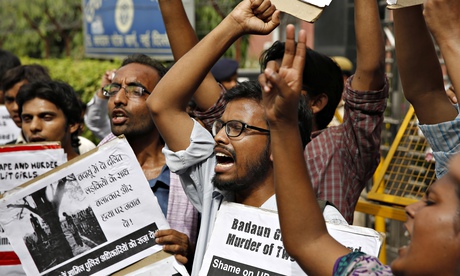Indian minister criticises lax policing in gang-rape case
Government pledges to set up 'rape crisis cell' after outcry over attack on two teenage cousins who later hanged themselves
A protest over the Katra rape case outside the Uttar Pradesh state house in New Delhi. Photograph: Manish Swarup/AP
The Indian government has pledged to set up a "rape crisis cell" after a spate of brutal sexual attacks on women.
This week, two cousins aged 14 and 15 were raped by a group of men in the northern state of Uttar Pradesh, and then apparently hanged themselves from a mango tree.
Angry relatives in the village of Katra accused the police of ignoring their requests to search for the girls after the pair disappeared on Tuesday evening, and protested by refusing to allow the bodies to be cut down from the tree once they were discovered. Footage of the scene, widely broadcast by Indian media, prompted outrage.
Villagers eventually allowed officials to take down the corpses after the first arrests were made on Wednesday. Police subsequently arrested two police officers and two men from the village, and were searching for three more suspects.
"Police laxity is equally responsible for the incident due to which two girls lost their lives. Police are still not acting in the right direction. All policemen involved in the incident should [have their employment] terminated," said Maneka Gandhi, the minister for women and child welfare.
Gandhi offered to order an inquiry by one of India's elite national investigative bodies should the family want it. The office of Narendra Modi, who was inaugurated as prime minister on Monday, has demanded a report on the incident.
Vrinda Grover, a lawyer and activist, dismissed the idea of a rape crisis cell as a "rehash for media consumption". She said: "This is an old idea that they are just bringing out again to satisfy the national and international media. There is no systemic effort to address the problem. No government makes this issue a priority."
Authorities in Uttar Pradesh are already under pressure for their failure to protect women amid a general deterioration in upholding law and order. On Thursday three men were arrested on suspicion of a brutal assault on the mother of a teenage rape victim in the town of Etawah after she refused to withdraw her criminal complaint.
Campaigners say such incidents are common, with attempts to intimidate witnesses frequent in all types of crime. Police often side with the most powerful local figures or accept bribes to drop prosecutions.
The two girls Katra were attacked as they went to fields to relieve themselves, as there was no toilet in their home. Under Indian law, rape victims cannot be named even after their death. However, the pair are known to have been from the dalit community, the lowest in the social hierarchy known as caste. Dalits are subject to widespread discrimination and harassment.
India's previous government, led by the centre-left Congress party, badly mishandled the aftermath of the gang rape and murder of a 23-year-old woman on a bus in Delhi in December 2012. The incident prompted deep anger and grief across the country and calls for reforms of policing and judicial process in India.
Senior Congress politicians appeared distant and slow to react to the public mood. A series of subsequent changes to the law, including tougher sentences and an attempt to improve the training of police officers, does not appear to have had a significant impact.
Recent statistics appear to show rising violence towards women, though the true extent of the problem is difficult to calculate. The social stigma attached to being a victim of rape, as well as distrust of the authorities, stops many women reporting assaults. Around a third of rape victims in India are below the age of 18, campaigners say.
"The number of reported cases does not reflect the true number of cases of rape and sexual assault, which are widespread throughout rural and urban India," said Sehjo Singh, India programme and policy director for ActionAid.
Last month, Mulayam Singh, a veteran politician, MP and the father of the chief minister of Uttar Pradesh, told an election rally that he opposed the death penalty for rapists. "Boys will be boys … They make mistakes,"he said.
Shireen Vakil Miller, of Save the Children India, called the attack on the two cousins "horrific" and "part of an alarming trend of brutal violence against those from marginalised communities".

